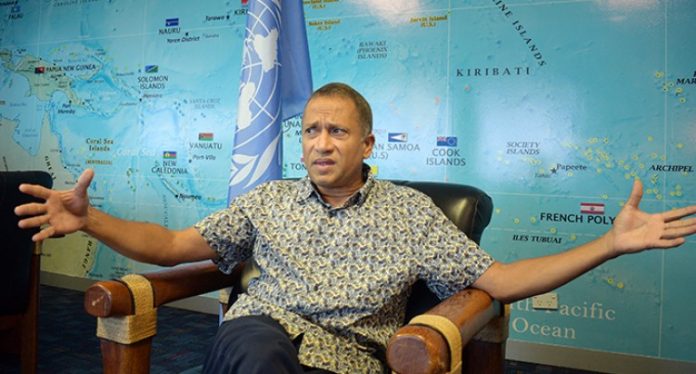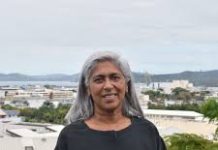By Sanaka Samarasinha, UN Resident Coordinator to Fiji, Solomon Islands, Tonga, Tuvalu, and Vanuatu
As we surface from an unexpected global pandemic which left us with immeasurable loss of life and brought the worst recession in 90 years, we find ourselves amidst another period of political turmoil and economic unpredictability.
For us in the Pacific, the climate emergency adds another layer of increasing urgency.
Against this bleak backdrop, however, we now have a more profound knowledge of our vulnerabilities and strengths, a deeper penetration of digital technologies – particularly in rural areas – a renewed appreciation for nature, and an opportunity to take back the last two years as we reorient towards greener, more inclusive economies and societies.
On 24th October, we marked UN Day – the 77th anniversary of the UN, and the day we collectively decided that working together was our greatest asset against the world’s most pressing issues.
The UN was created in the aftermath of great turmoil – so not only do we represent hope, we have the unique ability to convene to create hope and bring about real change.
What remains now is a bold decision by each of you, because our action or inaction in the next eight years will decide between a decade lost and a decade reclaimed.
While Fiji was among the five hardest hit economies in the world, experiencing the sharpest contraction in GDP growth in 2020 at almost 20 percent, Fiji’s post-COVID recovery is well underway and is estimated to grow by 12.6 percent in 2022 on the back of strong tourism recovery with an expected 55% tourist arrivals to pre-pandemic level.
Fiji’s outlook hinges on tourism activity and the impacts from the Ukraine war, as the country remains vulnerable to external shocks, particularly natural disasters and the effects of climate change.
The upcoming national election will be an important part of the backdrop over the next year.
The Sustainable Development Goals
Now more than ever, we need to harness and capitalis on the spirit of ‘accomplishment through unity’ to get back on track to achieving the SDGs by 2030 – indeed this is a bold agenda, but it requires nothing short of transformative actions and accelerated commitments from everyone.
Last year, we began the important journey of creating our UN Sustainable Development Cooperation Framework 2023-2027 – the blueprint of our work in the Pacific over the next five years.
Consulting with governments, civil society, development partners, the private sector, and CROP agencies, we have created a Pacific-wide framework which, for the first time, tangibly connects global goals to national development priorities and is aligned to the new 2050 Strategy for the Blue Pacific Continent launched by Pacific Islands Forum Secretariat (PIFS) this year.
In this five-year window, we have a shot to strengthen our joint work, recalibrate together, and refocus our efforts, so that come 2030, we are well on our way to ticking all 17 SDGs off our collective ‘to-do’ list.
The Blue Economy and Future Potential
This current tourism recovery is an opportune time for Fiji to rebuild its touristic offer with added value, including ‘safety’ as a defining characteristic, and greater investment in sustainability and greening the tourism sector.
As well as opportunities in the tourism sector, a potential lever for Fiji’s economic, social and gender transformation could be through harnessing Fiji’s demographic boom to unleash the potential of blue economy sectors in the country.
Additionally, stronger recovery from COVID-19 requires a review of national wealth (natural, human and productive capital) to identify potential entry points for diversification and shock-proof economies in Fiji.
In view of this, we will devote the next five years to strengthening ecosystem services, redesigning agri-food systems, advancing energy transition, supporting blue economy-based diversification, accelerating digital transformation, and expanding access to affordable financing through our UN Sustainable Development Cooperation Framework – the blueprint for our work in Fiji and the Pacific.
We will also support trade facilitation to help Fiji to realize its trading potential, enhance export competitiveness, and reduce the costs of essential imports – especially crucial for MSMEs.
The Climate Crisis and Vulnerability Challenges
A second challenge for Fiji, for no fault of its own, is its geographical location – Fiji is ranked the 15th most hazardous country in the world by the World Risk Index, based on high exposure to natural hazards and relatively low coping capacity.
According to a 2017 World Bank Report, the hazards impacting Fiji most severely are tropical cyclones and floods, with this likely to increase between 2080 and 2100 due to climate change.
The UN has a significant role to play as a ‘knowledge broker’, accessing international knowledge and expertise and channelling it to where it is needed most, when it is needed.
As well as dedicating US$10.2m to support Fiji’s climate change adaptation and mitigation programmes for 2022, we are also well placed to facilitate the exchange of information among Pacific small island developing States, enabling countries and territories to share their successes and lessons learned, to the benefit of all.
This ‘convenor’ role extends to knowledge and data gaps – identifying how these gaps can best be filled, and securing the capacity to do so, including in climate security.
I hope we can use our individual strengths (as a UN, and as the Fijian Government, private sector, civil society, and CROP agencies) to salvage the remaining eight years to reach the SDGs together.
Gender Equality and Human Rights
As gender inequalities continue to persist in Fiji, there is a need to strengthen and expand social protection systems to cover women – this can be via insurance, increased bargaining power at the household level, financial inclusion, and support to long-term income generation and agency.
Fiji acceded to the Convention on the Elimination of all forms of Discrimination Against Women (CEDAW) in 1995 and ratified it the same year.
However, when presented to the CEDAW Committee in 2018, key recommendations from the committee included – greater action to address violence against women, women’s low representation in Parliament and all decision-making positions, women’s limited access to justice, and a need to significantly increase funding for the national women’s machinery and capacity development for women’s civil society organisations.
Above all, it recommended Fiji develop “a comprehensive strategy to eliminate discriminatory stereotypes regarding the roles and responsibilities of women and men in the family and society.”
Women’s representation specifically in political bodies will enable a shift in policy priorities and expanded aspirations for other women and girls.
Investing in gender-sensitive responses to shocks, especially initiatives that build partnerships between governments and civil society, will help women better cope with uncertainty.
Women’s and social movements play a key role in advancing better legal rights to participate in economic life, greater representation in politics, better support for paid and unpaid domestic care work, better protection from sexual harassment, better access to land tenure, financial inclusion, overcoming stigma, and raising awareness around violence against women and girls.
Social movements can advance human rights and change cultural norms and narratives to expand agency and freedoms for all.
A national human rights institution, anti-corruption oversight bodies, and a stronger National Parliament and Judiciaries would enable an environment conducive to quicker development and greater freedoms.
As a long-standing development partner of Fiji, we will continue to work with Fiji on climate action, strategic restructuring of economic sectors, health and education, social protection, gender equality, childhood protection, and digital and blue economy development.
Other areas include food security, humanitarian aid and recovery, infrastructure, macroeconomic management, and relocation of communities at risk.
UN support across the Pacific for 2022 is approximately US$240m, with specific support to Fiji for 2022 at US$24m.
We stand ready to accompany you as you enter the next phase of your development journey, and move towards a more prosperous future for Fiji.
SOURCE: UNDP/PACNEWS


















